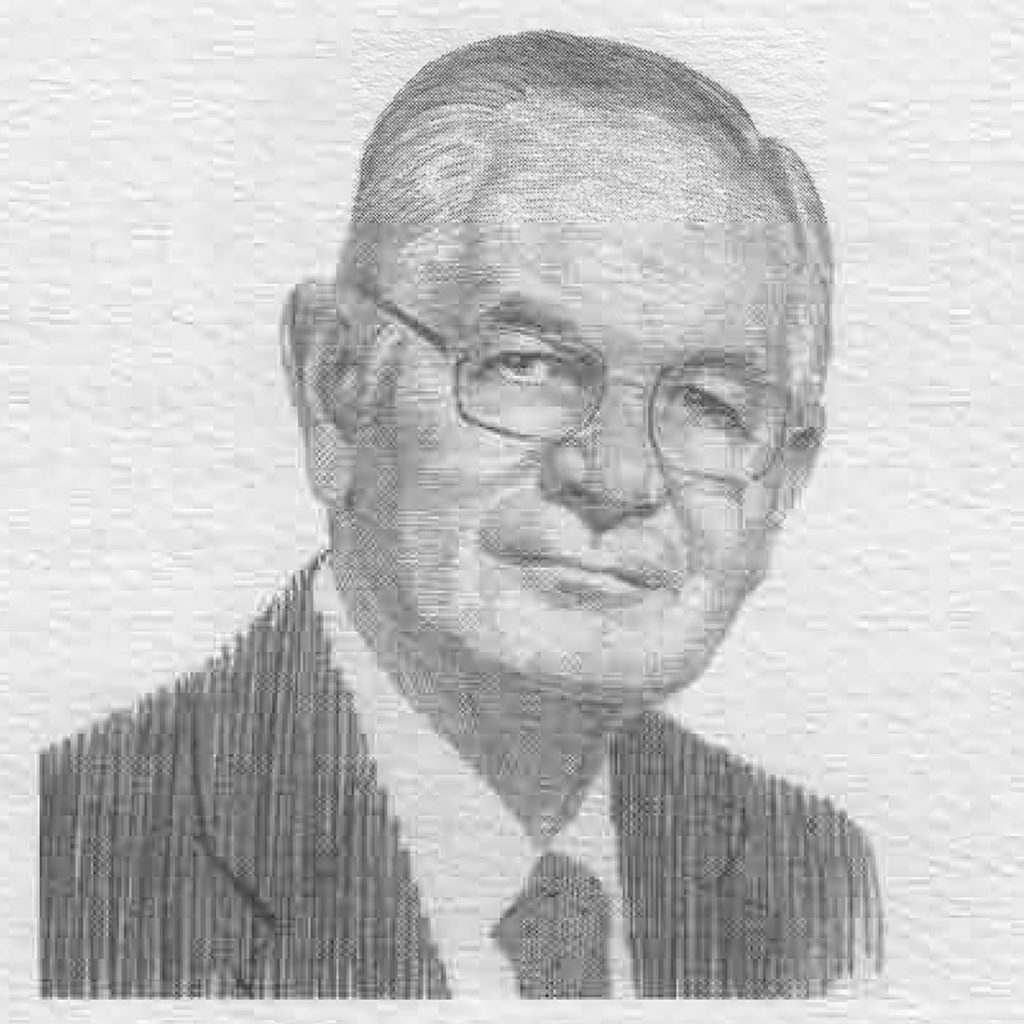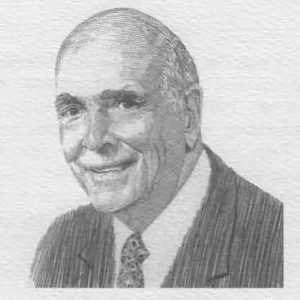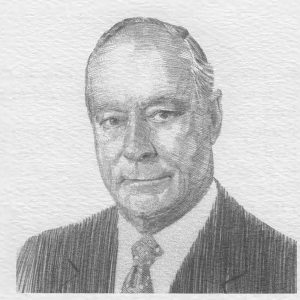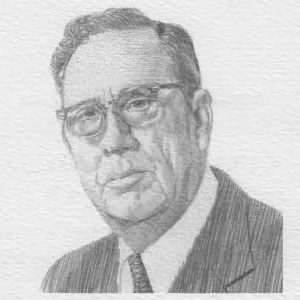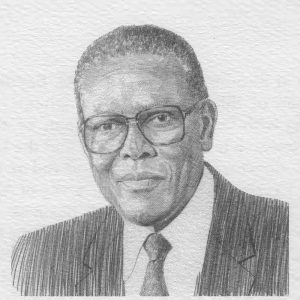One man: lawyer, banker, civic leader, teacher, friend. One man of courage. One man who mattered to us all. That was how The Tuscaloosa News described George Alexander LeMaistre in an editorial published the day before the former chairman of the Federal Deposit Insurance Corporation was laid to rest in September 1994.
George LeMaistre was born in Lockhart, Alabama, on September 8, 1911, to John Wesley and Edith McLeod LeMaistre, and came to live in Tuscaloosa, Alabama, in 1930 with his widowed mother and four younger siblings. Although he had not completed his undergraduate study, the young man entered The University of Alabama School of Law that year, and upon his graduation in 1933, commenced his first profession, the practice of law, in Tuscaloosa. The following year he was joined in law practice by his close friend Marc Ray “Foots” Clement. The two would remain partners in law practice for the rest of George Faith LeMaistre’s career as an attorney, and the closest of friends, as well as partners in politics and various business ventures, until Foots Clement died in 1961.
In 1939 George began teaching, part-time, as an adjunct professor at the UA law school. He would continue teaching at the university, in the School of Law or College of Commerce and Business Administration, for 49 of the next 56 years. He was co-author, with Professor Garrett Hagan, of Real Estate Handbook: Land Laws of Alabama, and author of Legal Aspects of Real Estate Transactions.
Throughout his life, George LeMaistre demonstrated a deep devotion to both his country and his God. In 1941 he enlisted in the U.S. Navy and served through 1945 as a lieutenant commander in Naval Intelligence, participating in the Normandy invasion and the invasion of southern France. It was during his military service that, on July 17, 1943, he was married to Virginia Mosby, a graduate of the University who was then working in the Washington, D.C., office of Alabama U.S. Senator Lister Hill. After the war ended, George returned to Tuscaloosa and resumed the practice of law as a founder of the firm LeMaistre & Clement, which became LeMaistre, Clement & Gewin in 1951 after Walter P. Gewin, later appointed a federal appellate judge, joined the firm.
An active member of the Democratic Party, George LeMaistre worked in the campaigns of Senators Lister Hill and John Sparkman, as well as campaigns of many other state and local political figures. He took active roles in the Alabama presidential campaigns of John F. Kennedy in 1960 and Lyndon Baines Johnson in 1964. In 1968, he was asked by New York Senator Robert Kennedy to serve as Alabama coordinator for that senator’s presidential campaign, a position which he enthusiastically accepted.
A Life Elder of the First Presbyterian Church of Tuscaloosa, for more than 50 years he taught Sunday School there, the men’s Bible Class, every week. The Rev. Charles Durham, a pastor of First Presbyterian, recalled that George LeMaistre’s Sunday School class was well attended by people interested in his biblical teaching as well as his insights into the world of national and international events. “The man is known for his incredible, brilliant mind, and for his just overwhelming wisdom, yet he’s a very quiet and true gentleman in every sense of the word,” said the Rev. Durham. “He could have wielded all sorts of power but did not.”
What he did do was turn his attention and efforts to further the cause of human relations, and was particularly proud, friends recalled, of his work with the National Conference of Christians and Jews – he was a member of its Board of Trustees and National Board of Governors from 1967 through 1978 – and of the Brotherhood Award he received from that organization in 1983. Former Tuscaloosa City Council President Bill Lanford recalled: “He was a true Southern gentleman above everything else. I never heard him get angry or raise his voice. He was always very deliberate in his decisions and his mannerisms, and he was a people person.”
George LeMaistre also devoted much of his life to the business and civic affairs of his community. In 1960, he embarked upon his second profession, giving up the practice of law to accept the position of president and chief executive officer of the City National Bank of Tuscaloosa.
It was during his tenure at City National Bank that the state of Alabama experienced the turmoil of the Civil Rights era, and it was George LeMaistre’s actions during this time that won him national acclaim. An article in the Thursday, November 24, 1962, New York Times, reporting the infamous pledge of Governor-elect George C. Wallace to defy federal authorities on the issue of desegregation, also contained the following account:
On the same day, George LeMaistre, president of the City National Bank of Tuscaloosa, warned the local Civitan Club of the economic penalties of racial violence. He then urged that they accept the Supreme Court as the final interpreter of the Constitution.
Mr. LeMaistre stated that no state official had the right to put himself above the law and that includes a Governor or a Governor-elect. “What happened in Mississippi does not have
to happen again – it would be tragic to think we learned nothing from the first incident,” he said.
The Tuscaloosa News reported that the bank president received a standing ovation.
In 1970, George LeMaistre was named president of the Alabama Bankers Association. In 1972 and 1973, he served for the American Bankers Association as vice chairman of its government relations council. It was his dedication to, and knowledge of, the second profession that caused President Richard M. Nixon to appoint him to the position of director of the Federal Deposit Insurance Corporation (FDIC), a seat that, by law, was to be held by a Demo crat. In 1977, following the election of Jimmy Carter as president, the Board of Directors of the FDIC elected George LeMaistre chairman of the corporation, and he served in that capacity for fourteen months. In 1978 he returned to teaching at the University as holder of the Alabama Bankers Education Foundation Chair of Banking in the College of Commerce and Business Administration, and as professor of law.
During George LeMaistre’s tenure as chairman, the FDIC proposed that state-chartered banks be permitted to offer interest-bearing checking accounts and allow customers to transfer funds automatically from savings to checking accounts, a controversial proposal at the time. He was also opposed to allowing banks to charge for such transfers, or to requiring customers to forfeit any interest accrued in a savings account.
Closer to home, he is remembered as the first chairman of the board of directors of Druid City Hospital, now known as DCH Healthcare Authority, and for leading the fund drive to move the hospital from the Northing ton campus to its current location. A life-long proponent of public education, he firmly believed in the unique benefits society can realize by ensuring that its citizens are pro vided with opportunities for quality education. In addition to the nearly half-century that he was engaged in teaching at The University of Alabama, he served as a member and as chairman of the Stillman College Board of Trustees; member and chairman of the Helena, Alabama, Indian Springs School Board of Governors; trustee of the Southwestern Graduate School of Banking at Southern Methodist University; first president of the Alabama Coalition for Better Education; member of the board of Alabama Educational Television; and as a member of The President’s Cabinet of The University of Alabama.
George LeMaistre is remembered by his colleagues in the banking and legal profess ions, his friends at the University, his neighbors in Tuscaloosa, and his colleagues in worship at the First Presbyterian Church as an individual of uncommon warmth, intelligence, judgment, and humor. He is survived by his wife of 51 years, Virginia Mosby LeMaistre; three children, Virginia L. Jones (Mrs. A.A. Jones, Jr.) of Decatur, Alabama, Ms. Alice LeMaistre of Bethesda, Maryland, and George Alexander LeMaistre, Jr., of Fairhope, Alabama; two brothers, Sam A. LeMaistre of Eufaula, Alabama, and Dr. Charles A. LeMaistre of Houston, Texas; seven grandchildren; and six great-grandchildren.

